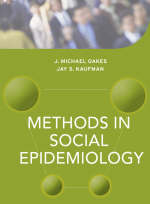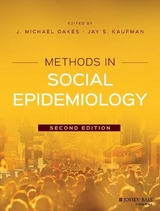
Methods in Social Epidemiology
Jossey-Bass Inc.,U.S. (Verlag)
978-0-7879-7989-8 (ISBN)
- Titel erscheint in neuer Auflage
- Artikel merken
Social epidemiology is the study of how social interactions-social norms, laws, institutions, conventia, social conditions and behavior-affect the health of populations. This practical, comprehensive introduction to methods in social epidemiology is written by experts in the field. It is perfectly timed for the growth in interest among those in public health, community health, preventive medicine, sociology, political science, social work, and other areas of social research.
Topics covered are: * Introduction: Advancing Methods in Social Epidemiology * The History of Methods of Social Epidemilogy to 1965 * Indicators of Socioeconomic Position * Measuring and Analyzing 'Race' * Racism and Racial Discrimination * Measuring Poverty * Measuring Health Inequalities * A Conceptual Framework for Measuring Segregation and its Association with Population Outcomes * Measures of Residential Community Contexts * Using Census Data to Approximate Neighborhood Effects * Community-based Participatory Research: Rationale and Relevance for Social Epidemiology * Network Methods in Social Epidemiology * Identifying Social Interactions: A Review, Multilevel Studies * Experimental Social Epidemiology: Controlled Community Trials * Propensity Score Matching Methods for Social Epidemiology * Natural Experiments and Instrumental Variable Analyses in Social Epidemiology * and Using Causal Diagrams to Understand Common Problems in Social Epidemiology.
"Publication of this highly informative textbook clearly reflects the coming of age of many social epidemiology methods, the importance of which rests on their potential contribution to significantly improving the effectiveness of the population-based approach to prevention. This book should be of great interest not only to more advanced epidemiology students but also to epidemiologists in general, particularly those concerned with health policy and the translation of epidemiologic findings into public health practice. The cause of achieving a 'more complete' epidemiology envisaged by the editors has been significantly advanced by this excellent textbook." -Moyses Szklo, professor of epidemiology and editor-in-chief, American Journal of Epidemiology, Johns Hopkins University "Social epidemiology is a comparatively new field of inquiry that seeks to describe and explain the social and geographic distribution of health and of the determinants of health. This book considers the major methodological challenges facing this important field.
Its chapters, written by experts in a variety of disciplines, are most often authoritative, typically provocative, and often debatable, but always worth reading." -Stephen W. Raudenbush, Lewis-Sebring Distinguished Service Professor, Department of Sociology, University of Chicago "The roadmap for a new generation of social epidemiologists. The publication of this treatise is a significant event in the history of the discipline." -Ichiro Kawachi, professor of social epidemiology, Department of Society, Human Development, and Health, Harvard University "Methods in Social Epidemiology not only illuminates the difficult questions that future generations of social epidemiologists must ask, it also identifies the paths they must boldly travel in the pursuit of answers, if this exciting interdisciplinary science is to realize its full potential. This beautifully edited volume appears at just the right moment to exert a profound influence on the field." -Sherman A. James, Susan B. King Professor of Public Policy Studies, professor of Community and Family Medicine, professor of African-American Studies, Duke University
J. Michael Oakes, Ph.D., is an Assistant Professor in the Division of Epidemiology and Community Health, University of Minnesota, and is affiliated with the Minnesota Population Center, the University's Metropolitan Design Center, and its Institute for Advanced Study. His research interests include social epidemiology, research methodology, and human research subject protections. Originally trained in sociological methodology and microeconomics at the University of Massachusetts, Dr. Oakes has authored papers exploring neighborhood effects, the measurement of socioeconomic status in health research, and the role of political-economic theory in social epidemiology. His recent work concerns "identification problems," especially in matched propensity score and regression models relying on observational designs. Dr. Oakes teaches graduate-level courses in secondary data analysis (with Stata), SAS programming, and group randomized trials, as well as a doctoral seminar on social epidemiology. He regularly attends National Institutes of Health study sections and consults with a number of not-for-profit community organizations. He established and currently directs the Social Epi Workgroup at the University of Minnesota. Jay S. Kaufman, Ph.D., is an Associate Professor in the Department of Epidemiology, University of North Carolina at Chapel Hill, a Fellow at the Carolina Population Center, and a Research Fellow at the Sheps Center for Health Services Research. Dr. Kaufman's research interests include social epidemiology, minority health, statistical methodology, and health care. He has published widely on social epidemiology, causal inference, and international health, among other topics, and is an Associate Editor for Epidemiologic Perspectives and Innovations and serves on the editorial board of the journal Epidemiology. His current research projects include research on social and community factors in the etiology of adverse birth outcomes, social position over the life course in relation to cardiovascular disease, non-parametric methods for covariate control and identification of direct effects for social factors, and racial and ethnic disparities associated with provision of medical care. Dr. Kaufman teaches courses in regression analysis and epidemiologic methods.
About the Editors. About the Authors. Preface. PART ONE: BACKGROUND. 1 Introduction: Advancing Methods in Social Epidemiology (J. Michael Oakes and Jay S. Kaufman). 2 The History of Methods of Social Epidemiology to 1965 (Christopher S. Hamlin). PART TWO: MEASURES AND MEASUREMENT. 3 Indicators of Socioeconomic Position (Bruna Galobardes, Mary Shaw, Debbie A. Lawlor, George Davey Smith, and John Lynch). 4 Measuring and Analyzing "Race," Racism, and Racial Discrimination (Saffron Karlsen and James Yzet Nazroo). 5 Measuring Poverty (David M. Betson and Jennifer L. Warlick). 6 Measuring Health Inequalities (Sam Harper and John Lynch). 7 A Conceptual Framework for Measuring Segregation and Its Association with Population Outcomes (Sean F. Reardon). 8 Measures of Residential Community Contexts (Patricia O'Campo and Margaret O'Brien Caughy). 9 Using Census Data to Approximate Neighborhood Effects (Lynne C. Messer and Jay S. Kaufman). PART THREE: DESIGN AND ANALYSIS. 10 Community-Based Participatory Research: Rationale and Relevance for Social Epidemiology (Paula M. Lantz, Barbara A. Israel, Amy J. Schulz, and Angela Reyes). 11 Network Methods in Social Epidemiology (Peter V. Marsden). 12 Identifying Social Interactions: A Review (Lawrence E. Blume and Steven N. Durlauf). 13 Multilevel Studies (Tony A. Blakely and S. V. Subramanian). 14 Experimental Social Epidemiology-Controlled Community Trials (Peter J. Hannan). 15 Propensity Score Matching for Social Epidemiology (J. Michael Oakes and Pamela Jo Johnson). 16 Using Causal Diagrams to Understand Common Problems in Social Epidemiology (M. Maria Glymour). 17 Natural Experiments and Instrumental Variable Analyses in Social Epidemiology (M. Maria Glymour). Name Index. Subject Index.
| Erscheint lt. Verlag | 16.6.2006 |
|---|---|
| Reihe/Serie | Public Health/Epidemiology and Biostatistics |
| Zusatzinfo | Illustrations |
| Verlagsort | New York |
| Sprache | englisch |
| Maße | 186 x 238 mm |
| Gewicht | 968 g |
| Themenwelt | Studium ► Querschnittsbereiche ► Epidemiologie / Med. Biometrie |
| ISBN-10 | 0-7879-7989-9 / 0787979899 |
| ISBN-13 | 978-0-7879-7989-8 / 9780787979898 |
| Zustand | Neuware |
| Informationen gemäß Produktsicherheitsverordnung (GPSR) | |
| Haben Sie eine Frage zum Produkt? |
aus dem Bereich



